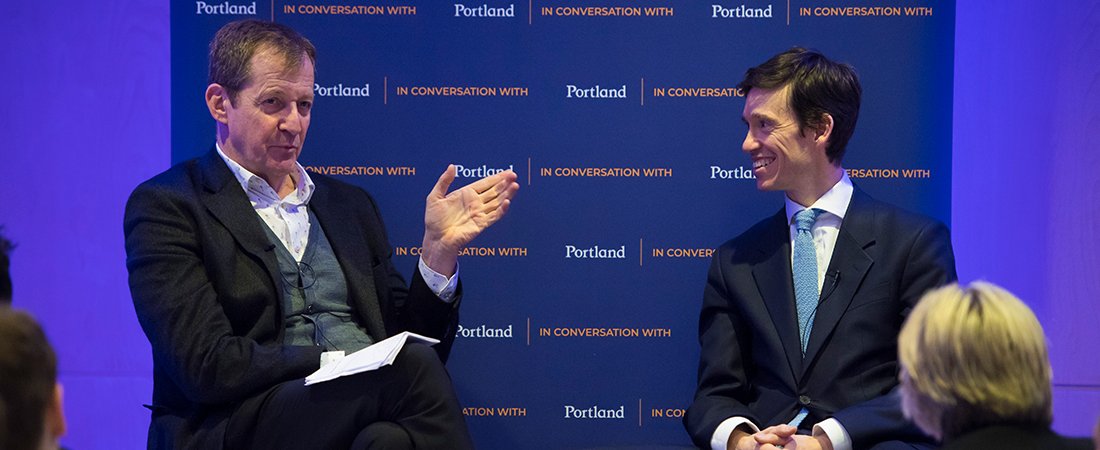On Wednesday evening we hosted a discussion between Portland’s Alastair Campbell and Rory Stewart, the former Tory Leadership candidate who is now running as an independent to be the next Mayor of London.
Here are the top five takeaways from the event:
1. On running as an independent: “I’m not going to say this is easy”
Rory began by acknowledging how with the current incumbent, Sadiq Khan, polling high and independent candidates not doing well in the recent General Election, people could question his candidacy. However, “independents have won these races before. Ken Livingstone won as an independent.” He believes that independent candidates are a “good match with cities” and that the electoral system for the mayoral election works well as they have a better chance of picking up second preferences. His target voters for first preferences are those 30-35 per cent in the centre who do not feel tight party allegiances. On his approach he acknowledges he needs lots of Labour votes and suggests he will do things that “will feel left wing to Sadiq Khan” and go much closer to the Corbyn end of the spectrum.
2. ‘Rory gets things done’
He spoke about the importance of communicating what he stands for, and how in modern campaigns you need to explain things quickly, if you talk in too much detail you lose people. ”My challenge is I need to get votes from people who don’t know who I am but will think I can get on with it.” With the Mayor of London being an executive role, rather than legislative like an MP, he believes his background can be used as evidence he can deliver. He said that as an MP he rarely spoke about his ‘past life’ experience in governing two provinces in Iraq totalling 3 million people, setting up a charity and working to restore the old city of Kabul but, “it’s more relevant here. Much more relevant to how we make the tubes run on time” for example.
3. Making the case for London
He feels that the current rhetoric of both the main political parties nationally doesn’t include London. One of the challenges for the mayor is to make the case for London again, not at the exclusion of other parts of the country but with, and for London. He challenged those voting in the London mayoral elections to ask themselves: do you feel safer than you did four years ago, is your housing more affordable, is your commute better?
4. “You’ve got to start where people are”
Asked by Alastair why he chose to spend 21 months walking across Afghanistan, Iran, Pakistan, India and Nepal, Rory told an anecdote about how as a British diplomat he felt he should find out what the reality of life was for the people living there. Rather than just accepting the set strategy that came across as abstract jargon that didn’t mean anything tangible: “you’ve got to start where people are and that’s what I have focussed on since then”. He spoke about taking the same approach when he was an MP in Cumbria, choosing to tackle the real issues people faced, such as why people were having to wait three weeks to see a GP and why there were not enough teachers at the local school.
5. “It’s all about details”
Speaking on Brexit, Rory shared his view that the UK would have been in a “much, much, much better position” if we had gone with Theresa May’s deal because it included a customs union that would have better protected high streets and agriculture, for example. He also raised concerns about the affordability of potential future visa costs for EU citizens living in London. To get the best outcome in the trade negotiations with the EU “the way you do it is to get into the details” and work as a coalition – just saying you are against Brexit won’t work. And speaking of details, unfortunately we still don’t have confirmation as to whether Rory was a spy, despite Alastair’s best efforts to find out on the evening!

